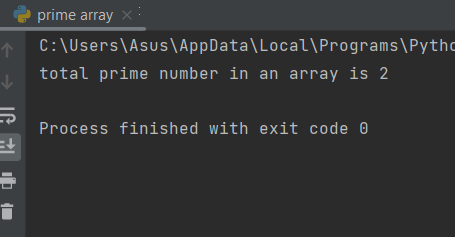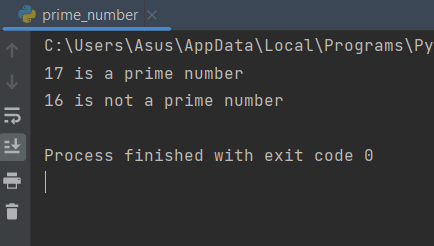Write a python program to check whether the given number is prime or not. Let’s create some examples in python to validate a prime number, also, will find the total count of prime numbers from an array.
A number that is divisible by 1 or itself is a called prime number like 7, 17, 19, 23, etc. A prime number can not be a negative number(-2,-5, etc..)
Check whether the number is prime or not in Python
Step 1 Create a function with a parameter
Step 2 Checking whether the number is negative or positive
Step 3 If it is positive then we run a loop from 2 to the range of number and then check if the range number and the given number are divisible by it and give zero as a reminder if it is so then the number is not prime
Step 4 But if it is not divisible then the number is a prime number
Step 5 As we are using the function we will use the return method to give the output
Input and Output Sample
Input = 17
Output = it’s a prime number
Input = 16
Output = it’s a not prime number
Algorithm to find Prime number in Python
- Creating a function with a parameter to take input
- Check whether the entered parameter(input) is negative or positive
- We will check whether the number is prime or not by running a loop with itself and dividing it and checking the remainder
- If the remainder is zero it is not a prime number
- If the remainder is not zero it is a prime number
Python Code to check whether the number is prime or not
def is_prime_number(num):
if num > 1:
for i in range(2, int(num/2)+1):
if (num % i) == 0:
return "is not a prime number"
else:
return "is a prime number"
else:
return "is not a prime number"
num=17
print(num,is_prime_number(num))
num2=16
print(num2,is_prime_number(num2))
Output
In this article part, we have seen how to check whether the number is a prime number or not, if we want the value as true or false we just replace the return part with true and false as per the condition.
Write a python program to find the count of prime numbers in an array
Step 1 we import our previous file using the import keyword and give it an alias name for convenience
Step 2 Then creates a function that takes an array as a parameter
Step 3 Then set the counter at zero
Step 4 Using for loop and accessing a single element at a time to check whether the number is prime or not
Step 5 By the is_prime_number method of the previous code, we give a single element and check whether the condition is satisfied or not
Step 6 If satisfied then the count stays the same while if not then the count will update once
Step 7 As we are using the function we return the result using the return keyword
Step 8 At the end, we create an instance to check our code
Algorithm to count prime numbers in an array
- Importing the previous code of checking the prime number validation
- Creating a function with a parameter that will take an array
- Set a counter to zero to start counting the prime number
- Now we run the array in the loop for accessing each element
- Check whether the accessed element is negative or positive
- Then giving value to the function of the previous code, we will check whether the number is prime or not
- Update count every time if it is a prime number
Python code to count prime numbers in an array
import prime_number as pn
def total_prime_number(arr):
count=0
for i in arr:
if pn.is_prime_number(i) == "is not a prime number":
count=count
else:
count=count+1
return count
arr=[24,31,27,23,54,45]x
print(total_prime_number(arr))
Output

In this article, we have learned how to check any prime number and in another part, we have also seen how to count all the prime numbers in a given array

